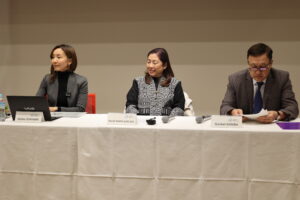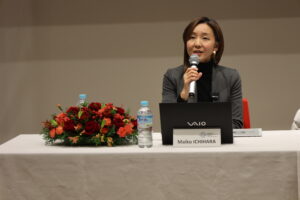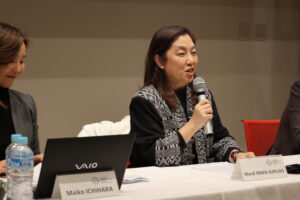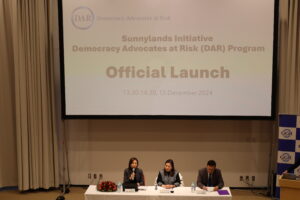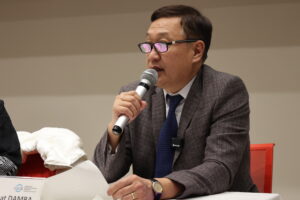On December 15, 2024, the Institute for Global Governance Research (GGR) hosted the official launch event for the “Democracy Advocates at Risk (DAR) Program.” The event took place at Intelligence Hall, Hitotsubashi University, and was attended by participants from embassies, governmental organizations, media outlets, non-governmental organizations (NGOs), and other sectors. Both in-person attendees and virtual participants joined the proceedings via a Zoom webinar. The DAR Program is designed to support democracy advocates fleeing prosecution by their governments in Asia. Through a network of universities and think tanks, the program aims to provide safe refuge and foster collaboration. The initiatives of the launch event for the DAR Program were featured in several newspaper articles, including Nikkei, Sankei, and Tokyo Shimbun.
Professor Maiko Ichihara (Graduate School of Law, Hitotsubashi University) provided a detailed overview of the DAR Program, elaborating on its background, objectives, scope, functions, and future plans. She highlighted the increasing persecution faced by democracy advocates in Asia, who often seek refuge in Europe or North America. However, geographic distance and time zone differences can hinder effective communication with their countries of origin. Professor Ichihara emphasized that Asia-based refuges could mitigate these challenges, a gap the DAR Program seeks to address. By establishing a network of individual researchers across Asian universities and think tanks, the program facilitates the identification of safe havens for democracy advocates. Upon receiving information about advocates at risk, GGR shares this with network members to find suitable accommodations. She noted the program’s gradual approach, aiming to assist approximately ten advocates annually.
Ms. Mardi Mapa-Suplido (CEO, Habitat for Humanity Philippines) discussed the specific challenges faced by democracy advocates in Southeast Asia and the potential contributions of the DAR Program. Referencing severe cases in Thailand, Myanmar, Vietnam, Cambodia, and the Philippines, she stated, “DARs are facing escalating risks that include harassment, imprisonment, forced disappearances, and digital repression aligned with the democratic backsliding and rising authoritarianism we see across the region.” She underscored the importance of a robust network to ensure the safety and well-being of advocates in the region.
Dr. Ganbat Damba (Academy of Political Education, Mongolia) began his remarks by affirming, “Everyone wants to be free to choose their own actions.” He described the dire circumstances faced by democracy advocates in Asia, calling for collaborative efforts from researchers, governments, and foundations. He noted that individuals advocating for human rights in Northeast Asia are often treated as “second-class citizens.” Concluding his speech, he expressed optimism, stating, “Together, we can build a better Asia.”
Following the panelists’ presentations, a Q&A session was held, with questions from both in-person and virtual participants. The panelists clarified that GGR serves as the DAR Program’s secretariat without direct government involvement while collaborating with organizations such as the Asia Democracy Network. Additionally, GGR plans to engage in fundraising initiatives to alleviate the financial burdens on partner researchers within the network. The panelists also emphasized the unique significance of the DAR Program, noting that it is the first initiative in Asia specifically dedicated to protecting democracy advocates facing human rights-related prosecutions. While detailed information about three ongoing pilot projects remains confidential, these projects represent the initial steps in operationalizing the program’s objectives.
【Event Report prepared by】
WATANABE Eru (Master’s student, School of International and Public Policy)
KISHI Akihito (Undergraduate student, Faculty of Law)
NAKAJIMA Takahiro (Master’s student, Graduate School of Law)

